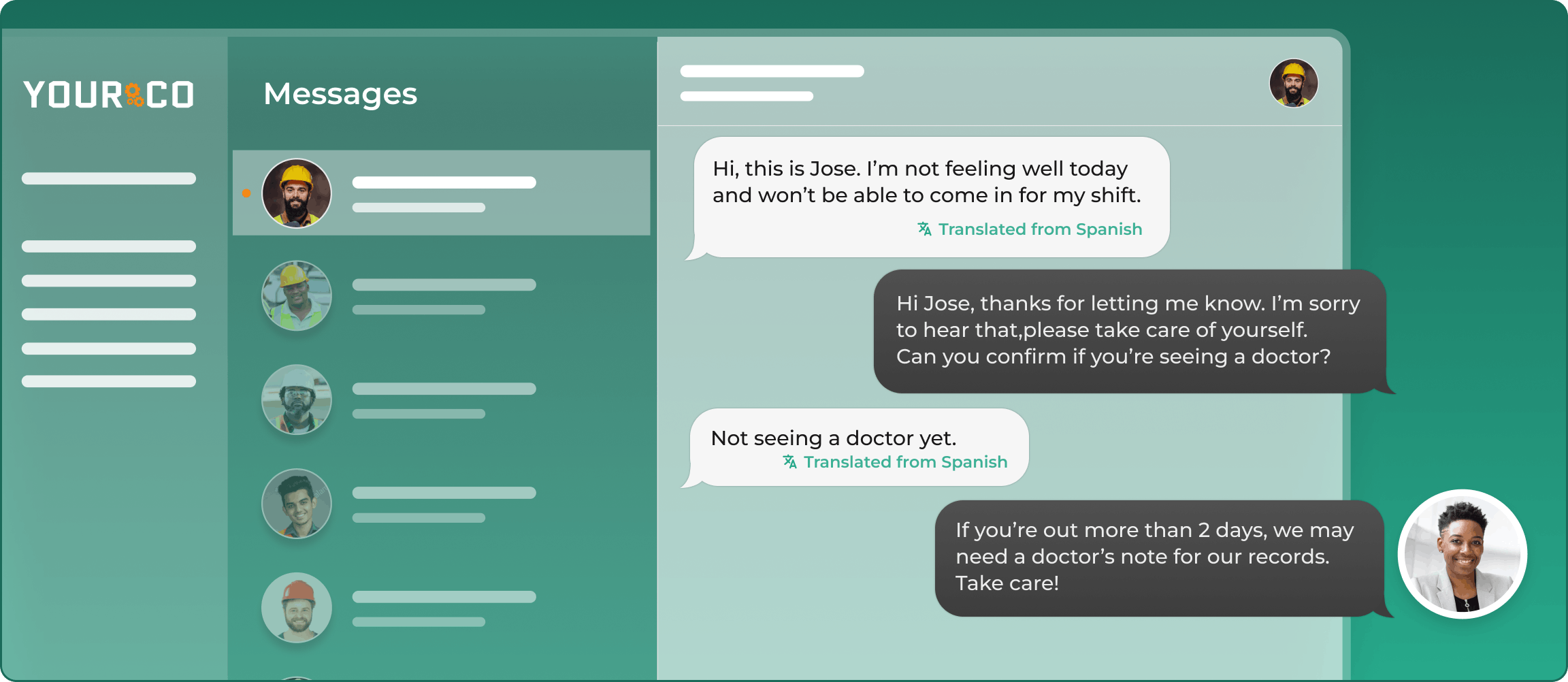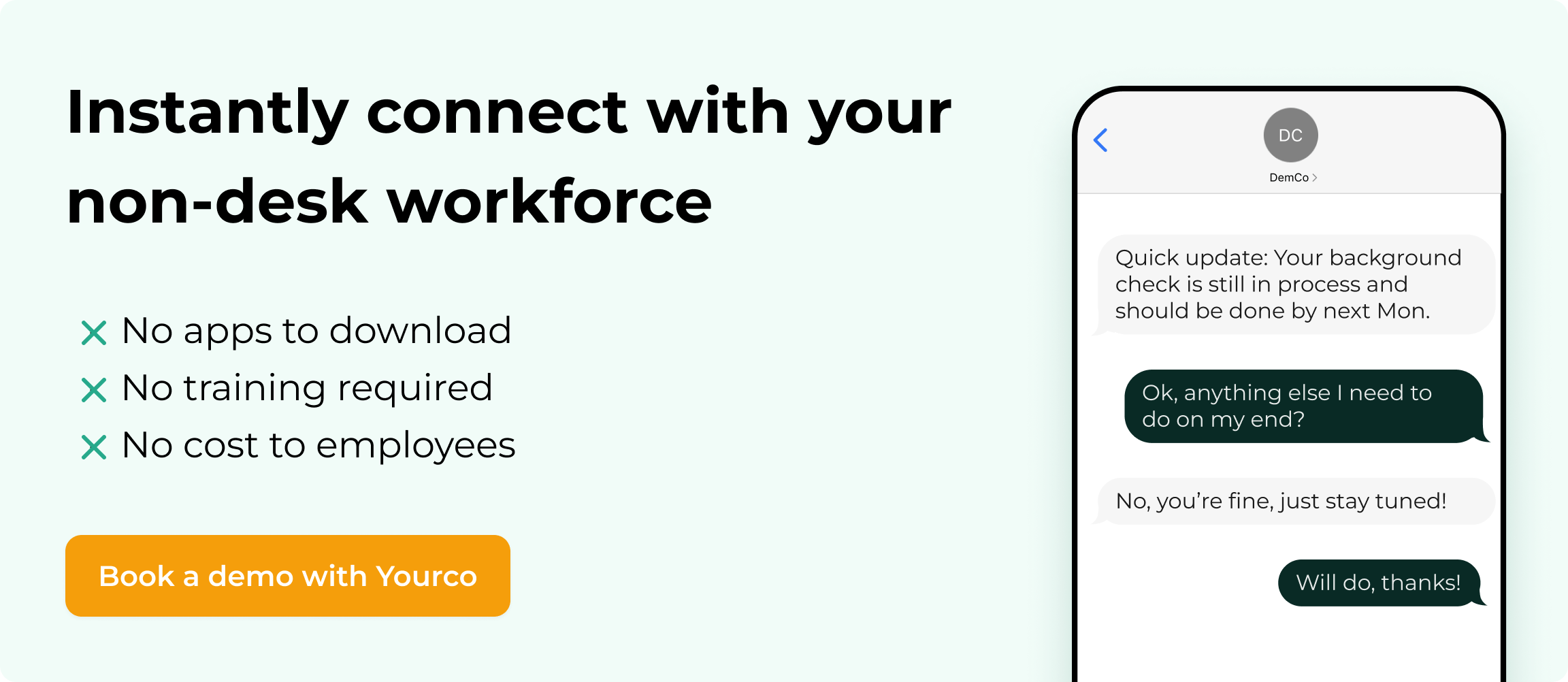Should Employees Be Allowed to Call Off Work via Text? Pros and Cons for HR


Texting has become the simplest way for many employees to report an absence, especially in jobs where phone calls or online portals aren’t practical. For HR, it offers speed, accessibility, and a reliable record of every call-off. Still, it can also blur boundaries and make policy enforcement more complicated.
In this article, we’ll break down the pros and cons so you can decide if allowing call-offs by text is right for your workplace.
Benefits of Allowing Call-Offs by Text
Texting a quick "I'm out sick" might sound informal, but it solves four real problems for HR and operations teams. You get immediate notice, clear records, access for every worker, and fewer frantic phone calls from supervisors. Here's how each benefit plays out during a busy shift:
1. Get Instant Notification and Coverage
Speed matters during shift changes. When an employee sends a text, the message arrives in seconds without voicemail, hold music, or waiting for office hours.
Key benefits:
- Most texts get read within three minutes
- Gives you time to adjust schedules before your line slows down
- Works on any basic phone from anywhere (bus stop, home, no internet required)
It's the fastest way to go from "I'm sick" to "coverage handled."
2. Create Better Documentation
Every text creates an automatic record. Each message includes a timestamp and the employee's exact words, eliminating "I called but no one answered" disputes.
What you get:
- Messages stored for years (helpful for FMLA reviews, attendance discussions)
- Clear documentation with no room for confusion
- Early pattern recognition for absence trends
- No more deciphering handwritten notes or missed voicemail
With this digital trail, you can have clear documentation when you need it. The message is there, timestamped, with no room for confusion about what was said or when.
3. Reach Every Worker Equally
SMS works for everyone. Most frontline employees don't check email during shifts, but nearly everyone has a phone.
Universal access means:
- No downloads, passwords, or high-speed internet needed
- Multi-language templates collect consistent details
- Translation tools bridge communication gaps
- Accessible alternative for employees who prefer not to make phone calls
Everyone gets the same easy, private way to follow company policy.
4. Reduce Manager Stress
Managers handle absences while juggling ten other urgent tasks. Text call-offs eliminate phone tag and provide flexibility.
How it helps:
- Read messages when you can safely step away from the floor
- Shared system lets any supervisor handle the call-off
- Clear written details reduce back-and-forth questions
- Know who's out, why, and for how long before your first cup of coffee
Bottom line: SMS call-offs turn a chaotic moment into a manageable process, giving you the speed, clarity, and peace of mind needed to keep operations running smoothly.
Challenges of Allowing Call-Offs by Text
Text reports feel easy, but they carry hidden downsides. When you rely on SMS for sick calls, the casual tone can lower accountability, muddy documentation, and even expose you to wage-and-hour complaints or privacy concerns. Below are the four pain points HR leaders wrestle with most:
1. Lack of Formality
Casual messaging undermines workplace standards. A short text like "sick, back tomorrow" doesn't match the seriousness of missing a shift, creating an atmosphere that can normalize last-minute absences.
The problems this creates:
- Messages on personal phones blur work-life boundaries and professional expectations
- No vocal cues make it harder to interpret tone, urgency, or genuine need
- Minimal effort required can encourage more frequent call-offs across your workforce
- Informal tone pushes against the accountability structures that keep attendance consistent
Solution: One way to ensure texts don't get too informal is to create standardized call-off templates that require specific details like employee ID, shift date, and reason for absence. When employees know exactly what information to include, messages stay professional even in a casual format.
2. Potential for Miscommunication
SMS strips away context that prevents costly mistakes. While people open texts almost immediately, autocorrect, slang, or a mistyped date can derail schedules in seconds.
Why this happens:
- Text messaging removes vocal emphasis and context that clarifies meaning
- Managers may underestimate urgency without hearing stress in someone's voice
- Messages can fail to deliver without the sender knowing what happened
- Rushed updates during busy periods increase the risk of critical miscommunication
Solution: The key to preventing miscommunication is implementing delivery confirmation and requiring consistent information in every message. Two-way messaging lets you quickly clarify details when something seems unclear, turning potential confusion into clear communication. When employees do call off, knowing how to respond professionally helps maintain clear expectations and a supportive workplace culture.
3. Policy Enforcement Challenges
Individual supervisor phones create documentation nightmares. Texts that flow to personal devices scatter records across countless locations, making consistent policy application nearly impossible.
What goes wrong:
- Deleted message threads or phone changes eliminate your audit trail permanently
- Proving policy compliance or spotting attendance patterns becomes much harder
- Inconsistent enforcement across locations creates fairness complaints from employees
- Legal exposure increases when discipline application varies between managers and sites
Solution: You can solve enforcement problems by funneling every absence through one centralized platform that automatically logs and timestamps each message. This approach creates the complete record you need while ensuring managers handle absences consistently across all locations. Managers can also reply directly in the conversation to approve time-off requests or coordinate immediate shift coverage, keeping all communication about the absence in one thread.
4. Compliance and Privacy Concerns
After-hours expectations and health data storage create serious legal risks. Wage-and-hour rules get complicated the moment you expect employees to read or answer messages outside work hours.
The risks include:
- Off-the-clock violations: Expecting responses to work texts can become unpaid wage claims
- Privacy breaches: Health information on personal devices falls outside secure company systems
- Data exposure: Lost phones or weak device security can leak sensitive employee information
- Retention problems: Unclear data storage rules make regulatory compliance and legal defense harder
Solution: Smart companies address these risks by using enterprise-grade SMS platforms with built-in encryption and role-based access controls. Clear policies about after-hours communication expectations help avoid wage issues, while secure, centralized storage keeps sensitive information protected.
Build a Text Call-Off System That Works
Clear policies, a dedicated text line, and organized records turn SMS call-offs from chaotic pings into reliable data you can use. The right approach eliminates the headaches while preserving the convenience.
Start with a written call-off policy that's easy to find and understand. A simple guide explains who to contact, when to report, and what information to include. This removes confusion and helps you apply rules fairly across the board. Documentation also protects you from claims of favoritism, which becomes especially important when managing attendance issues.
Next, funnel every absence through one centralized number or platform instead of letting texts scatter across personal phones. A centralized system automatically timestamps each message, stores it securely, and instantly notifies supervisors. This gives you a complete record of who said what and when, without the back-and-forth of trying to track down information later.
Employees should include the same core details every time:
- Name or employee ID
- Date of the missed shift missed
- Reason, if your policy requires it
- Expected return date or next available shift
Consistent information makes it much easier to spot attendance patterns and address issues before they become bigger problems.
Review your policy at least once a year and update any scripts as laws or schedules change. Train managers to handle absences the same way, whether someone texts at 2 a.m. or during lunch break.
Finally, connect your text system to payroll and scheduling tools whenever possible. Real-time HR integrations prevent double data entry and reduce the errors that come with manually transferring information. With these systems in place, texting stays convenient for workers while giving you the structure and documentation you need to manage attendance effectively.
Simplify Absence Reporting with Yourco
You need a fast way for employees to call off while still keeping clean records. Yourco gives you both. With the text-off-line feature, employees can quickly notify their company by texting when they can't make a shift, instead of calling. When someone sends a simple text from any phone, it creates an automatic, time-stamped record of every absence for easy audits and pattern tracking.
Messages stay stored in one secure place, keeping sensitive details off personal devices and reducing privacy risks. Yourco also supports over 135 languages and dialects, so every team member, whether on the loading dock or in the field, can report a sick day without struggling with language barriers.
When a call-off text arrives, managers and schedulers get automatic alerts, giving you time to rearrange coverage before the shift starts. You can manage everything from a single dashboard instead of juggling personal phone numbers, helping you enforce one clear policy across sites.
Yourco connects to your existing HR and payroll tools, so attendance data flows straight to the systems you already use. You get reliable documentation; employees get an easy, familiar way to communicate.
Try Yourco for free today or schedule a demo and see the difference the right workplace communication solution can make in your company.
Frequently Asked Questions
Is texting a legally valid way for employees to call off work?
Yes, if your attendance policy includes it as an option. Many companies allow text call-offs because they create a time-stamped record. We highly recommend employers to set up an employee handbook which outlines company policy on communication channel and call-off arrangements.
What details should employees include in a call-off text?
Keep it simple. Ask for the shift date, start time, reason (if your policy requires it), and when they expect to return. Good systems automatically add the employee's name and exact timestamp, giving you a complete record for your files.
How can HR prevent abuse of text call-offs?
Set clear rules about who to text, how early to notify, and what happens if someone misses the deadline. Use one dedicated number so messages don't end up on personal phones. A system that logs every absence, spots patterns, and sends automatic receipts makes enforcement fair and easy to track.
Which industries benefit most from text-based call-off systems?
Any workplace where employees don't sit at desks all day. Manufacturing, logistics, construction, hospitals, and retail stores all need fast staffing changes. Sudden gaps in these environments can be costly and disruptive.
How does an SMS platform differ from personal texting?
A business SMS platform saves every message securely, controls who can see what, and alerts the right managers instantly. Personal texting can't provide that level of documentation or security. Professional platforms like Yourco also integrate with your existing HR systems for better record-keeping and eliminate manual work on syncing the employee directory, most notably when terminations occur.
Yourco also provides advanced features, such as AI translations and built-in polls and surveys. Additionally, you can leverage role-based admission control, which personal texting platforms like WhatsApp don't offer.




